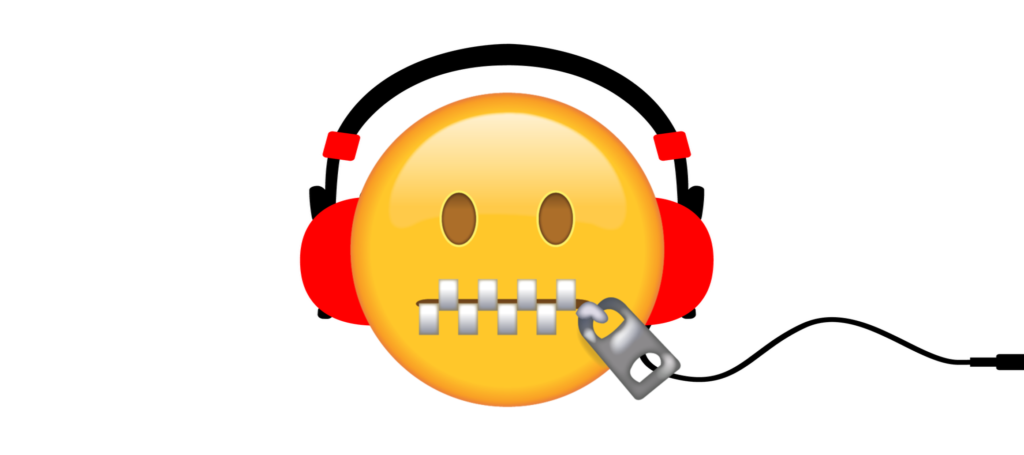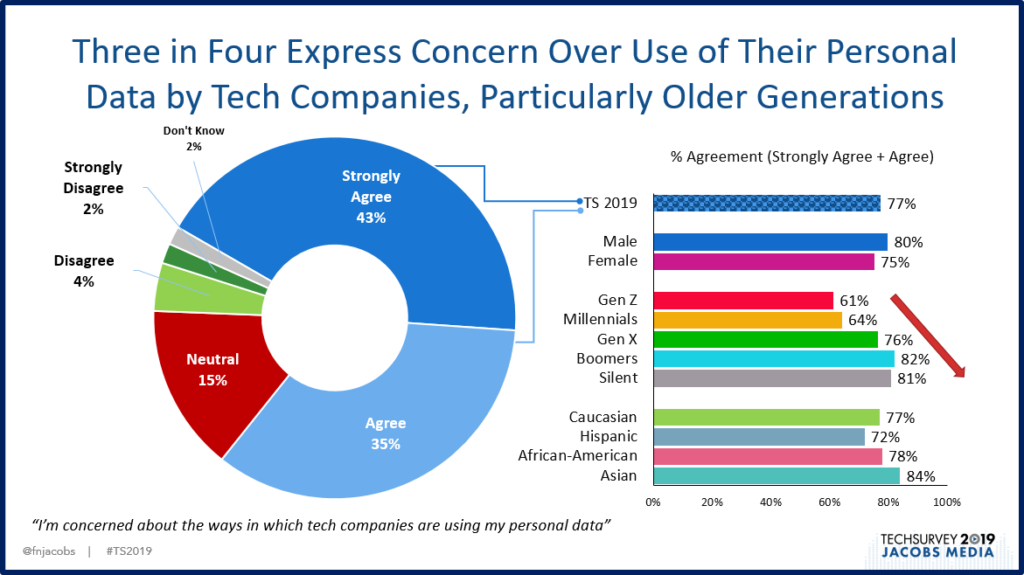
We try very hard in each year’s Techsurvey to look into new question areas that may have relevance for the radio broadcasting industry. Over the years, we’ve had some success, nailing the cell-phone only problem, identifying the extinction of the clock radio and its implications, as well as understanding the importance of the “connected car” well ahead of the industry. We’ve been investigating voice in the form of smart speakers for three years running now, and showing the link between on-demand video and on-demand audio – better known as podcasts.
But there’s been an issue bubbling under throughout the digital media landscape for several years now, and it is affecting consumer behavior:
Privacy
At their big showcase presentation in the Steve Jobs Theater yesterday, Apple didn’t introduce a watch, a tablet, a phone, or a new operating system. They focused on two key areas – subscription content and privacy.
That latter topic is an unusual one for a tech company to “roll out” at these gala events. The big news revolved around upgrades in Apple Pay and the promise of financial security through the development of an Apple Card that lives in the iPhone in its Wallet feature. And beyond Apple Pay, newly minted Apple credit cards offer unique consumer protections to “set a new level for privacy and security.”
And synergistically over the weekend, during the NCAA “March Madness” tournament, Apple started running this powerful commercial that cleverly addresses the privacy issue.
https://www.youtube.com/watch?v=A_6uV9A12ok
We started working at the margins of the privacy issue when we began to ask Techsurvey respondents whether they’d be willing to submit their names, zip codes, and email addresses in order to access their favorite station’s stream. And in year one – 2015 – the returns looked pretty impressive. A majority of respondents were just fine submitting this basic info in exchange for accessing their favorite station’s stream. And the following year, it got even better as seven of ten of those who stream audio were more than fine with giving up this information.
But in the ensuing years, the percentage has dropped. In Techsurvey 2019, we’re down to 60%. Last year, we asked those uncomfortable with submitting this info to tell us why. Nearly three-fourths blamed their reluctance on “privacy concerns.”
In this year’s study, we devoted more questionnaire “real estate” to better understanding the audience as it relates to their data and their personal information. And we were especially interested to learn more about the subgroups – generations, genders, and format affiliations – that express the highest degree of concerns about privacy.
And then we got the results back to this statement:
“I’m concerned about the ways in which tech companies are using my personal data.”

Note that the youngest generations are the least bothered about privacy breaches and personal data. That’s no fluke. We saw this in person during our Millennial ethnographic research conducted for PRPD a couple of years back. And it’s an ongoing theme we’ve noticed in focus and listener advisory board groups conducted among young people, most of whom believe their data is already “out there” so they may as well engage in their preferred online activities.
Older generations – the same ones who were shocked to learn that Facebook was marketing their web activity – are most irked by the ongoing snafus faced by tech companies, retailers, and even government agencies. Last week, FEMA admitted they shared the personal data from 2.3 million victims of disasters with a temporary-housing contractor. Amazingly, Wired points out this wasn’t a hack, but simply “overshared data.”
Sp. what does this have to with radio?
Whether you’re a commercial radio station hoping to sign up listeners for your email or text database, or you’re a public radio station striving to do well in your next pledge drive, privacy concerns are becoming a fast-moving fog permeating all aspects of our online, financial, and personal lives. Web security is at the heart of government probes, social media hearings, and of course, digital advertising. You may not adhere to the concept of “fake news,” but you have to accept the fact more and more listeners are questioning whether anything they’re being told by companies, corporations, the government, and media is, in fact, true.
Stations that have built up solid “trust bridges” with their audiences and advertisers have a decided edge. In fact, there may be marketable benefits (assuming your data IS secure and carefully monitored) for radio brands that do the right thing – by their listeners and their advertisers.
We can expect more tech innovations like the kind Apple rolled out yesterday in Cupertino. In much the same way food brands have been pushing “health” as a marketable advantage, companies that effectively and cleverly tackle privacy can distance themselves from competitors who lag behind or don’t get it.
I’m looking forward to sharing our data today with our stakeholders in a private webinar, on Thursday at the Worldwide Radio Sumit in Burbank, and over the next weeks and months with all of you.
It’s totally secure and we’re hoping it provides the AI – Audience Intelligence – you’ve come to count on.
Securely, of course.
- Can Radio Afford To Miss The Short Videos Boat? - April 22, 2025
- Media And Technology In 2025: Believe It Or Not! - April 18, 2025
- In Radio, You Just Never Know - April 17, 2025




Leave a Reply